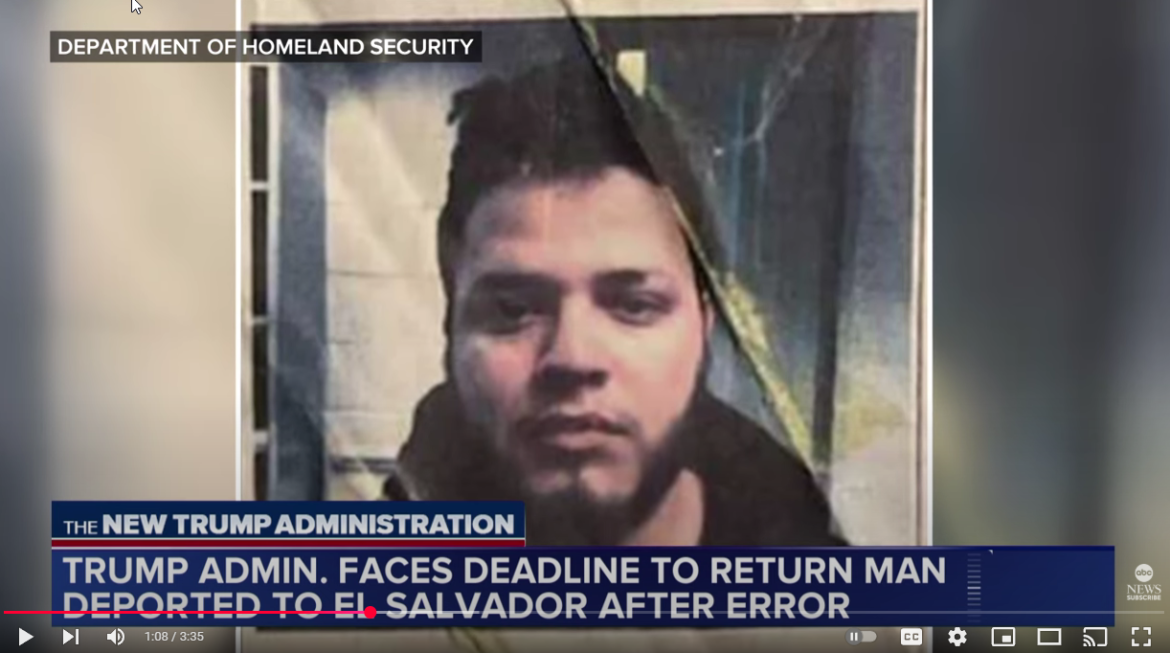The Trump administration races against the clock on April 7, 2025, urging the U.S. Supreme Court to intervene and halt a federal judge’s order mandating the return of Kilmar Abrego Garcia, a Maryland man mistakenly deported to El Salvador, by midnight tonight. U.S. District Judge Paula Xinis issues the directive on Friday, April 4, demanding that the government facilitate Garcia’s return from a notorious Salvadoran mega-prison, the Terrorism Confinement Center (CECOT), where he languishes following what the Justice Department concedes is an “administrative error.” The White House, in a last-ditch emergency filing, argues that the judge’s deadline oversteps judicial authority and encroaches on executive powers, setting the stage for a high-stakes legal showdown as the clock ticks down.
Garcia’s saga begins on March 12, when Immigration and Customs Enforcement (ICE) officers detain him in an Ikea parking lot in Maryland, his five-year-old autistic son in the backseat. Despite a 2019 immigration judge’s ruling granting him “withholding of removal”—a legal shield barring deportation to El Salvador due to credible fears of gang persecution—Garcia finds himself on a March 15 deportation flight alongside hundreds of alleged gang members. The administration later admits the move is a mistake, attributing it to a clerical oversight that sees him swapped onto the flight as an “alternate.” Now held in CECOT, a facility known for its brutal conditions, Garcia’s plight sparks outrage among immigrant advocates and his family, who rally for his return.
Judge Xinis, presiding in Greenbelt, Maryland, delivers a scathing rebuke of the deportation during a Friday hearing, calling it “wholly lawless” and an “illegal act.” She orders the government to bring Garcia back by 11:59 p.m. PDT on April 7, dismissing Justice Department claims that Salvadoran custody renders his return impossible. “They put him there; they can bring him back,” asserts Andrew Rossman, a lawyer from Quinn Emanuel who joins Garcia’s legal team. Xinis underscores the irreparable harm Garcia faces each moment he remains in the prison, where human rights groups report beatings, starvation, and rampant violence. Her ruling galvanizes dozens of supporters who cheer outside the courthouse, including Garcia’s wife, Jennifer Vasquez Sura, a U.S. citizen who tearfully pleads, “My children are waiting to be reunited with their father tonight.”
The Trump administration scrambles to reverse the order. On Saturday, the Justice Department appeals to the 4th U.S. Circuit Court of Appeals, arguing that Xinis lacks jurisdiction to compel a foreign sovereign to release Garcia. The appellate court, in a unanimous decision on Sunday, upholds Xinis’s order, with Judge Stephanie Thacker blasting the government’s actions as “unconscionable” and affirming its ability to rectify the error. Undeterred, Solicitor General D. John Sauer files an emergency appeal to the Supreme Court on Monday morning, just hours before the deadline. “The Constitution charges the President, not federal district courts, with the conduct of foreign diplomacy,” Sauer writes, labeling Xinis’s injunction “patently unlawful” and warning it could damage U.S.-El Salvador relations.
The White House doubles down on its narrative, casting Garcia as a member of MS-13, a gang designated as a foreign terrorist organization. Press Secretary Karoline Leavitt insists, “He’s not some American father—he’s a threat to the public,” despite no criminal charges or convictions against him. Garcia’s attorney, Simon Sandoval-Moshenberg, counters that the gang allegations rest on flimsy evidence—a confidential informant’s claim and a Chicago Bulls hat he wore at arrest—calling them “nonsense.” Xinis agrees, noting in court, “I haven’t been given any evidence,” and dismissing the claims as “just chatter.” The administration’s own lawyer, Erez Reuveni, admits during the hearing that Garcia “should not have been removed,” a concession that leads to his abrupt placement on leave by Attorney General Pam Bondi, who demands “zealous advocacy” from her team.
Garcia’s backstory reveals a man who flees El Salvador at 16 in 2011, escaping gang threats against his family’s pupusa business. After entering the U.S. illegally, he builds a life in Maryland, marrying Vasquez Sura and raising three U.S.-citizen children while working as a sheet metal apprentice. His 2019 immigration victory ensures his safety from deportation—until this year’s blunder. The incident ties into Trump’s broader immigration crackdown, which includes invoking the 1798 Alien Enemies Act to deport alleged gang members, a policy facing its own Supreme Court challenge. Since taking office in 2025, Trump intensifies enforcement, deporting over 260 individuals to CECOT in March alone, often without due process, drawing criticism for targeting legal residents and asylum seekers alike.
Breaking news updates escalate the drama as the deadline nears. At 12:09 p.m. PDT on April 7, the Supreme Court has yet to rule, leaving Garcia’s fate hanging in the balance. Posts on X indicate mounting public pressure, with advocates rallying under hashtags like #BringKilmarHome, while Trump allies like Stephen Miller deride Xinis as a “Marxist judge” overstepping her bounds. NBC’s Gary Grumbach reports from Washington, noting, “The lower courts have been ruling against the White House,” a trend Sauer’s filing to the Supreme Court desperately seeks to reverse. Meanwhile, Vasquez Sura holds a vigil with supporters, her voice breaking as she says, “In a blink of an eye, our family was broken.”
The case reverberates beyond Garcia, spotlighting the Trump administration’s deportation machinery. Past missteps—like the 2018 family separations—haunt its record, while this incident fuels debate over executive power versus judicial oversight. If the Supreme Court grants the stay, Garcia remains in limbo; if it denies it, the administration faces a diplomatic scramble to retrieve him from a prison tied to a $6 million U.S.-El Salvador deal. Economists warn Trump’s concurrent tariff policies could complicate foreign negotiations, adding pressure to an already tense situation. As midnight approaches, the nation watches a legal and human crisis unfold in real time.
Sources:
- Video: NBC News report on Trump administration’s Supreme Court request
- Web sources including npr.org, cbsnews.com, washingtonpost.com, cnn.com, nbcnews.com, bbc.com, reuters.com, politico.com, apnews.com, nytimes.com, abcnews.go.com, kcci.com
- Posts on X reflecting public sentiment and breaking updates
- General knowledge of Trump’s immigration policies and historical deportation cases



